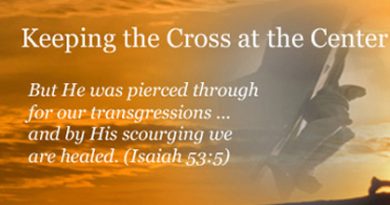Forgiveness: 3 More Myths
Many popular ideas about what it means to forgive don’t describe real forgiveness at all. Forgiveness myths abound. I identified (and, I hope, dismantled) five of these myths in an earlier post on forgiveness. But more myths remain: the idea that forgiveness is passive, the equally misleading idea that forgiveness is useless, and the assumption that forgiveness is optional.
Myth: Forgiveness Is Passive
Somehow we get the idea that forgiving another person means doing nothing but sitting back and passively absorbing mistreatment. That has a ring of truth to it – sometimes we aren’t to resist mistreatment – but it also misses the point. Forgiveness isn’t defined by behavior (doing something …not doing something) but by a change in our hearts. We end up being for the other person; we give up vendettas and hatred – those are all heart choices. Once our hearts become forgiving, wisdom may dictate either activity or apparent “passivity”: speech or silence, exposing another’s deed or, at least for a time, letting it remain unaddressed.
I say apparent passivity, because even if we do nothing externally, forgiveness requires considerable internal work. Forgiveness is anything but passive. Do you remember the interchange from the movie “The Last Dance”? The condemned woman’s lawyer asks her why her accusers can’t forgive someone who has changed, and she replies “Because if they forgive, they have to change too.” They have to change. And so do we. If we forgive we have to change too. How must we change? What does forgiveness require of us?
- Forgiveness requires that we stay aware of our individuality.
If we aren’t certain that we make our own choices, that we choose with the Lord what is wise, we’re stuck with fear-based compliance, needy dependence, or guilty efforts to meet unfair demands. We can’t make wise choices if we’re acting as another person’s puppet. Forgiveness is something given from strength, not from weakness. - Forgiveness requires humility.
You may be thought a fool or a loser if you don’t assert your “rights.” That can feel humiliating. But I’m not advocating humiliation, I’m advocating humility. They’re quite different. Humility ≠ humiliation. Humiliation fills us with shame. Humility shines with quiet dignity. - Forgiveness requires patience.
Forgiveness and waiting go hand in hand. We may or may not see earthly justice or restoration of a relationship. The other person may or may not ever believe they’ve wronged us or understand that they’ve broken the bond we once shared. We have to wait, and waiting can hurt. (Did you know that the Greek word for patience means “long-suffering”?) - Forgiveness requires wisdom.
There is no one-size-fits-all method for forgiving. Instead of thinking about methods (what to do, what to say, when to say it – behavioral advice), we need to ask a question: “What might expose the wrong and move them to repentance?” That takes wisdom. And prayer. And time. Patient waiting is important as well, for knee-jerk reactions are rarely wise. [Dan Allender’s book, Bold Love is an excellent resource for thinking through wise choices about forgiveness. I highly recommend it.] - Forgiveness requires the ability to bear sorrow.
Our heart may break when we watch the recipient of our forgiveness retaliate, spurn, or ignore our gift. We’ll experience loneliness, misunderstanding, and apparent failure. Sorrows. It gives perspective to realize that Jesus, among other things, was a man of sorrows. As He makes us more like Himself, our level of sorrow will increase. Sorrow does, however, have a hidden benefit, for sorrow is the path out of anger.
Myth: Forgiveness Is Useless
We worry that if we forgive the other person will never change. But forgiveness can be a catalyst that triggers profound change. Paul (quoting Proverbs 25:21-22) reminds us of this fact: But if your enemy is hungry, feed him, and if he is thirsty, give him a drink; for in so doing you will heap burning coals upon his head (Romans 12:20). Paul is saying that doing the good work of forgiving unnerves and exposes evil. Then he challenges us: Do not be overcome by evil, but overcome evil with good (Romans 12:21). The kindness inherent in forgiveness may also be the very thing that melts another’s recalcitrant heart. The kindness of God has softened my heart … might it not have the same effect on my enemy? (See Romans 2:4 … the kindness of God leads you to repentance.)
Myth: Forgiveness Is Optional
In Forgiveness: A Rather Unsettling Issue I comment on those two disturbing “ifs” from Jesus’ Sermon on the Mount: if we forgive we will be forgiven and if we don’t forgive we won’t be forgiven. Both Matthew and Mark make the same point. (See Matthew 6 and Mark 11.) This is serious. Forgiveness is, in a sense, optional, but only if we don’t care about being forgiven. But if we want to be forgiven? Then forgiveness isn’t optional at all.
A Few Questions
- Among things that forgiveness requires of us, are there any from my list that you find more difficult?
- Have you ever experienced (or helped another experience) that kindness leads to repentance?
- What’s your reaction to Jesus’ warnings about forgiving and being forgiven?
Forgiveness: Forgiveness: 3 More Myths
© Lynne Fox, 2015
biblegrapes.com


Lynne,
Thanks for the great posts on forgiveness. They are indeed nourishing me with spiritual insight and guidance in addressing forgiveness in family hurt relationship issues. May your posts and my application of them give glory to our Lord and Savior. Take Care and God Bless.
Arnold
You’re most welcome – I’m glad they’re helpful. Thinking through this topic with the Lord is nourishing my heart as well.